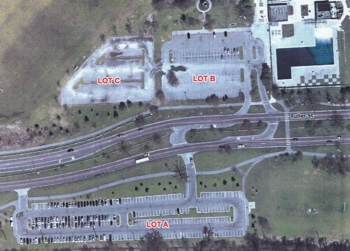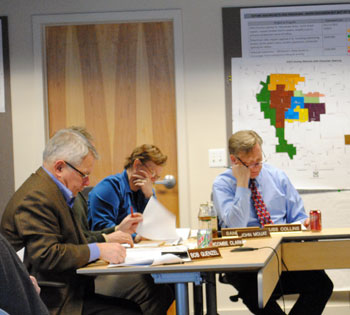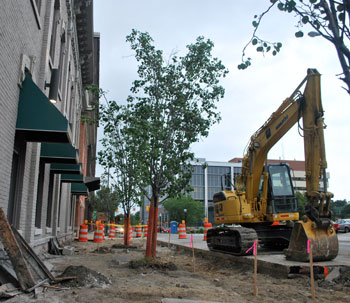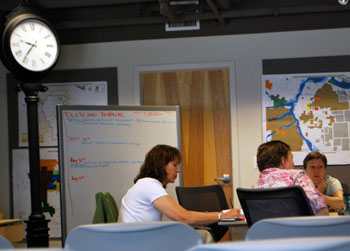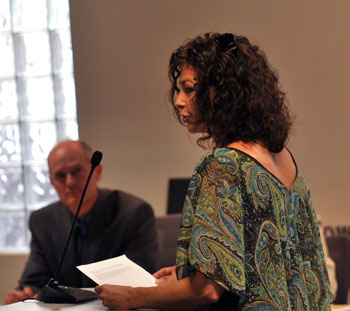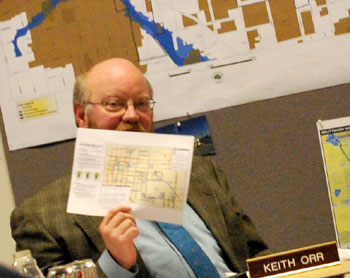Washtenaw County board of commissioners meeting (Nov. 20, 2013): After a final debate, commissioners adopted the 2014-2017 general fund budget, an unprecedented long-term document that some commissioners believe will improve strategic investments and organizational stability.
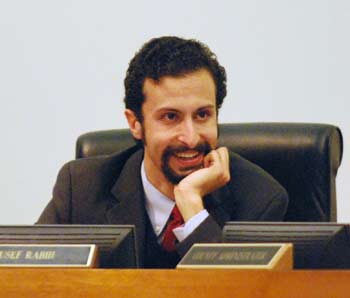
Yousef Rabhi (D-District 8), chair of the Washtenaw County board of commissioners. (Photos by the writer.)
At their Nov. 20 meeting, commissioners made several amendments, but did not substantively change the originally proposed budget submitted by county administrator Verna McDaniel in early October. Initial approval had been given during a six-hour meeting on Nov. 6, 2013. The Nov. 20 meeting lasted about two-and-a-half hours.
The vote was 7-1, with dissent from Ronnie Peterson (D-District 6) – though he cited three elements of the budget that he wanted to support: the community impact statements, outside agency funding, and position modifications. Rolland Sizemore Jr. (D-District 5) was absent. Dan Smith (R-District 2), who had dissented in the initial vote on Nov. 6, stated that he still had several concerns with the budget, but he voted for it because the budget supported many important activities throughout the county. He noted that although it spanned four years, the board is required by state law to approve the budget each year, so “technically it’s a one-year budget.”
Several new amendments were made during deliberations on Nov. 20. An amendment proposed by Conan Smith (D-District 9) directs the administration to conduct a study of county staff “to assess the capabilities of the organization to meet the community outcomes and processes.” Another amendment directs the administration to conduct a “citizens experience study” that would help inform board priorities.
Alicia Ping (R-District 3) proposed an amendment to shift $500,000 from the facilities, operations & maintenance fund to a contingency fund for parking. That contingency fund will serve as a placeholder as the county renegotiates parking contracts with the Ann Arbor Downtown Development Authority. The current contract, signed in 2004, runs through 2023.
As he has on previous occasions, Peterson argued against the four-year budget approach, preferring to maintain the current two-year budget process. He said that if he’s re-elected in 2014, he’ll fight to overturn the four-year budget and institute a one- or two-year budget instead. The board’s leadership – including Rabhi and Felicia Brabec (D-District 4), chair of the board’s ways & means committee – believe a four-year budget will improve long-term planning and stability, and could be transformational to the way that the county does business.
The board leadership also wants the board to be engaged in a continual process of monitoring the outcomes related to budget investments. To that end, on Nov. 20 the board also voted to adopt a set of “community outcomes” to guide that investment, as well as a framework for developing future budgets that reflect those desired outcomes. [.pdf of community outcomes resolution] Those outcomes are more detailed “impact statements” tied to budget priorities that the board approved on July 24, 2013.
A major discussion point at the Nov. 6 meeting – about the impact of budget cuts on the sheriff’s office – received much less attention on Nov. 20. However, after the meeting Rabhi told The Chronicle that discussions are underway with the sheriff, and that there will be a budget amendment brought forward soon that will address some of the concerns that have been raised by sheriff Jerry Clayton.
In addition to the budget, the board handled two items related to workforce development: (1) giving initial approval to accept $1,154,683 in funding from the Partnership Accountability Training Hope (PATH) program, which is part of Michigan’s welfare system; and (2) approving amended bylaws for the county’s workforce development board.
During public commentary, Christina Lirones advocated for the board to opt out of Pittsfield Township’s State Street corridor improvement authority (CIA). On Nov. 6, commissioners had voted to approve a tax-sharing agreement with Pittsfield Township and the CIA, which means that a portion of county taxes will be used to help fund the project. Lirones noted that there’s still time for the board to change its mind – as the board has one more meeting, on Dec. 4,
The board made one appointment on Nov. 20, adding York Township supervisor John Stanowski to an exploratory subcommittee for the future of the Washtenaw County road commission. Rabhi also indicated that nominations to other volunteer boards, committees and commissions would be brought forward for a board vote on Dec. 4. Though the deadline for submitting applications had passed, the deadlines have been extended until Dec. 1 for openings on three groups: the southeast Michigan’s Regional Transit Authority (RTA); the Washtenaw County historic district commission; and the Washtenaw County food policy council. More information about these positions is posted on the county’s website.
At the end of the meeting, Rabhi reminded commissioners that a holiday reception will be held prior to the board’s next meeting on Dec. 4, in the lobby of the county administration building at 220 N. Main from 4-6 p.m. [Full Story]




